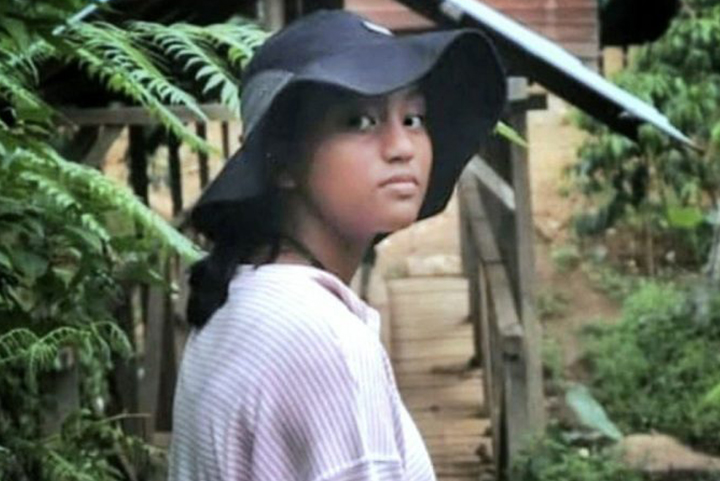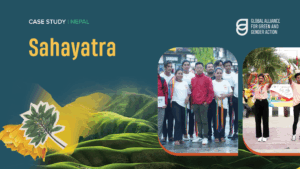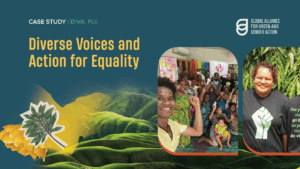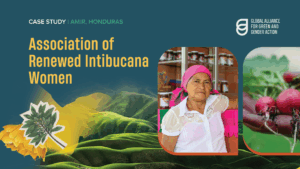Young and Fearless: The Powerful Voices of Young Women Environmental Rights Defenders at COP28

Bordered by the radiant tapestry of Indonesia’s diverse ecosystem, lies the heart of a resilient group named SERUNI, a national democratic women’s organization. In the words of Nasywa, a 16 year old dedicated member of SERUNI Youth, “We organize women from all sectors, from workers to peasant women, indigenous women, urban poor women, student women, and fisherwomen.” Their passion is mirrored in the efforts they exert towards gender equality, control over land and natural resources, and above all, the pursuit of climate justice.
The severity of Indonesia’s climate issues isn’t lost on its youth. Nasywa recollects her childhood memory, marred by the extremities of the haze disaster in 2015. Born in Riau, she emphasizes, “Land fire and haze disasters are chronic problems, particularly in regions like Sumatra and Kalimantan.” The land fires, often a result of slash-and-burn techniques, are aggravated by the proliferation of Palm Oil plantations. As forests are cleared to make way for these vast monocultures, the rich peatlands, once damp and resistant to fires, dry out. When ignited, whether accidentally or intentionally for agricultural purposes, these peatlands release massive amounts of carbon and produce a thick, toxic haze. Not only does this lead to a dramatic loss in biodiversity, but also impacts the health and livelihood of millions of residents in the region.

These challenges, tragically rooted in forest degradation and mining, rob the Indonesian youth of the once lush environment their elders grew up in. From the tales of clear water rivers filled with fish to vast wetlands home to exotic species like the Sumatran Tiger, Sumateran Elephant, and Orang Utan, these stories have gradually transformed into myths for the newer generation. Nasywa illustrates this through her involvement with a study on the Batanghari River in Jambi, Sumatra’s longest river. “The condition of the river is unspeakable,” she states, highlighting how practices like the expansion of oil palm plantations have devastated the local ecology.
Amidst Indonesia’s crucial ecosystems facing continued threats, the voice of the youth, especially young women, seeks to echo in global platforms such as COP28. “I want the aspirations and interests of our youth, especially young women, to be heard and incorporated into the resolutions of COP28,” she asserts, emphasizing the need for a better earth for her generation.
While SERUNI’s groundwork is commendable, from promoting the maintenance of ancestral fruit trees among the Malayan people to bamboo conservation, they understand the value of international advocacy. But the global climate dialogue has its shortcomings. The voices of the youth, Indigenous women, and environmental justice organizations have often been overshadowed. Nasywa rightly points out, “We come from Indonesia, one of the world’s most biodiverse regions, and we want to be heard.”

Yet, in the face of limitations presented by global forums like COP28, resilience shines. SERUNI, tapping into the heightened environmental awareness among the youth, continually broadens its network. “The good news today is that environmental issues are more popular among the youth than before,” she reflects, hinting at the silver lining. Their conscious efforts to engage with international youth, women, and national minority forums have one aim: to promote environmental solutions and garner support for ongoing mitigation activities.
In a time where climate realities become ever more pressing, the unwavering spirit of organizations like SERUNI and the young activists behind them is a beacon of hope. Like fresh buds emerging after a harsh winter, their tenacity and passion show that the new generation is leading the charge towards reclaiming our future.
–
The Global Alliance for Green and Gender Action (GAGGA) will be present at COP28 with a delegation between November 30 to December 12, 2023. Join us at our side event “Gender Just Climate Policy & Finance: From Barriers to Actionable Solutions” on Sunday, 3 December, where we delve deep into themes central to this article. For collaboration opportunities and to learn more, please contact Noemi Grütter, GAGGA Co-Coordinator, Advocacy and Collaborations: n.grutter@fondocentroamericano.org. For additional insights around this article and SERUNI’s work and to connect directly, reach out to Triana Kurnia Wardani from SERUNI at seruniindonesia.official@gmail.com.
—
This story and GAGGA’s COP28 actions are supported by Global Affairs Canada and The Dutch Ministry of Foreign Affairs. Their contribution has been instrumental in GAGGA’s efforts to highlight critical issues and voices at COP28.
Read more






